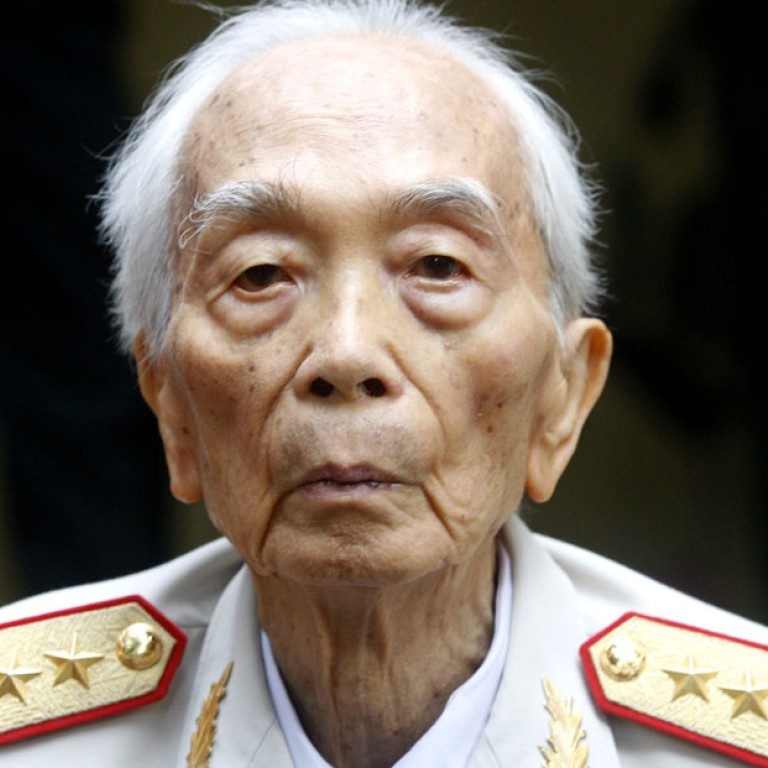
Vietnam’s military mastermind Vo Nguyen Giap dies in Hanoi
Vo Nguyen Giap led ragtag guerilla army to victory over colonial power at Dien Bien Phu, then defeated America's Saigon puppets 21 years later
Vo Nguyen Giap
1911-2013
Vo Nguyen Giap, the brilliant and ruthless self-taught general who drove the French out of Vietnam to free it from colonial rule and later forced the Americans to abandon their gruelling effort to save the country from communism, has died. At age 102, he was the last of Vietnam's old-guard revolutionaries.
Giap died yesterday evening in a military hospital in the capital, Hanoi, where he had spent close to four years growing weaker and suffering from long illnesses.
Giap was a national hero whose legacy was second only to that of his mentor, founding president Ho Chi Minh, who led the country to independence.
The so-called "red Napoleon" stood out as the leader of a ragtag army of guerillas who wore sandals made of car tyres and lugged their artillery piece by piece over mountains to encircle and crush the French army at Dien Bien Phu in 1954. The unlikely victory led not only to Vietnam's independence but hastened the collapse of colonialism across Indochina and beyond.
Giap went on to defeat the US-backed South Vietnam government in April 1975, reuniting a country that had been split into communist and non-communist states.
"No other wars for national liberation were as fierce or caused as many losses as this war," Giap said in 2005, on the eve of the 30th anniversary of the fall of Saigon, the former South Vietnamese capital.
"But we still fought because for Vietnam, nothing is more precious than independence and freedom," he said, repeating a famous quote by Ho Chi Minh.
Born on August 25, 1911, in central Vietnam's Quang Binh province, Giap became active in politics in the 1920s and worked as a journalist before joining the Indochinese Communist Party. He was jailed briefly in 1930 for leading anti-French protests and later earned a law degree from Hanoi University.
He fled French police in 1940 and met Ho Chi Minh in southwestern China before returning to rural northern Vietnam to recruit guerrillas for the Viet Minh, a forerunner to the southern insurgency later known as the Viet Cong.
During his time abroad, his wife was arrested by the French and died in prison. He later remarried and had five children.
In 1944, Ho Chi Minh called on Giap to organise and lead guerilla forces against Japanese invaders during the second world war. After Japan surrendered to allied forces, the Viet Minh continued their fight for independence from France.
Giap never received any formal military training, joking that he attended the military academy "of the bush".
At Dien Bien Phu, his Viet Minh army surprised elite French forces by surrounding them. Digging kilometres of trenches, the Vietnamese dragged heavy artillery over steep mountains and slowly closed in during the bloody, 56-day battle that ended with French surrender on May 7, 1954.
It was the final act that led to French withdrawal and the Geneva accords that partitioned Vietnam into north and south in 1956. It paved the way for war against Saigon and its US sponsors less than a decade later.
The general drew on his Dien Bien Phu experience to create the Ho Chi Minh Trail, a clandestine jungle network that snaked through neighbouring - and ostensibly neutral - Laos and Cambodia, to supply his troops fighting on southern battlefields.
Watch: Gen. Giap outmaneuvered the French and the Americans
Against American forces with their sophisticated weapons and B-52 bombers, Giap's soldiers again prevailed.
"We had to use the small against the big; backward weapons to defeat modern weapons," Giap said. "At the end, it was the human factor that determined the victory."
On April 30, 1975, communist forces marched through Saigon with tanks, bulldozing the gates of what was then known as Independence Palace.
Throughout most of the war years, Giap served as defence minister, armed forces commander and a senior member of Vietnam's ruling Communist Party, but he was slowly elbowed from the centre of power after Ho Chi Minh's death in 1969.
He stepped down from his last post, as deputy prime minister, in 1991.
Giap celebrated his 100th birthday in 2011. He was too weak and ill to speak, but he signed a card thanking his "comrades" for their outpouring of well wishes. And even then, he continued to be briefed every few days about international and national events, said Colonel Nguyen Huyen, Giap's personal secretary for 35 years.
